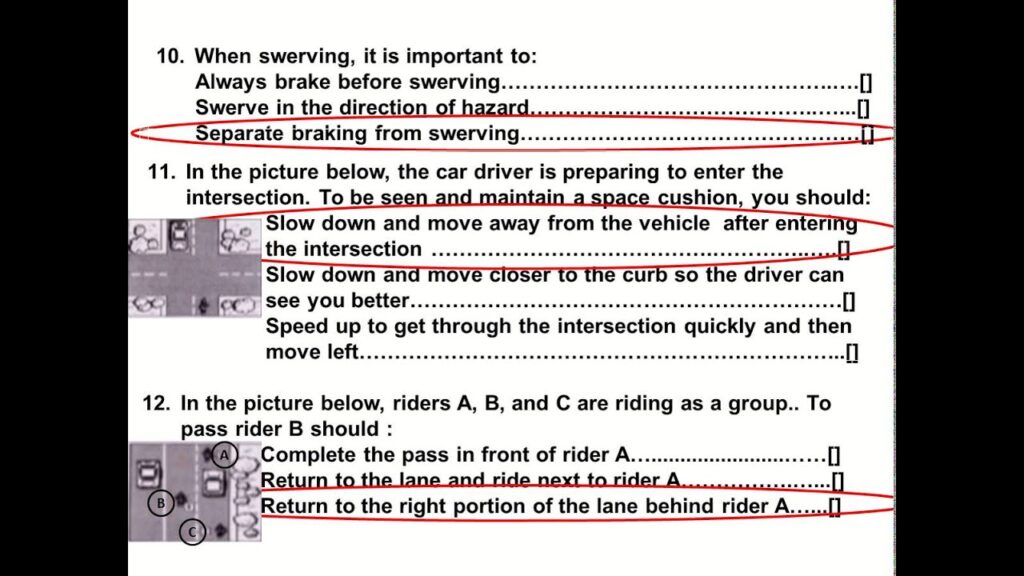Introduction
the Motorcycle Knowledge Test, Whether you’re a first-time rider or looking to upgrade your skills, passing the motorcycle knowledge test is a crucial step in obtaining your motorcycle license. This test assesses your understanding of safe riding practices, traffic laws, and motorcycle operation. In this blog post, we’ll explore what to expect from the motorcycle knowledge test, how to prepare effectively, and tips for success.
What is the Motorcycle Knowledge Test?
The motorcycle knowledge test is a written exam designed to evaluate your knowledge of important concepts related to motorcycle safety and operation. It typically consists of multiple-choice questions covering:
- Motorcycle controls and maintenance
- Road signs and signals
- Traffic laws and regulations specific to motorcycles
- Safe riding techniques
Why is the Motorcycle Knowledge Test Important?
- Safety First: The knowledge test ensures that all riders understand essential safety principles, which is vital for reducing accidents on the road.
- Legal Requirement: Passing the test is a mandatory step in the licensing process, allowing you to move on to the practical riding test.
- Building Confidence: Familiarity with the material helps build your confidence as a rider, setting a strong foundation for future skills.
Preparing for the Motorcycle Knowledge Test
1. Study the Motorcycle Operator’s Manual
The first step in preparation is to thoroughly read the Motorcycle Operator’s Manual provided by your local licensing authority. This manual contains all the information you’ll need to know for the test.
2. Take Practice Tests
Utilizing practice tests can significantly improve your chances of success. Here’s how to incorporate them into your study routine:
- Official Practice Tests: Check your local motor vehicle department’s website for official practice tests that reflect the actual exam format.
- Online Resources: Many websites offer free or low-cost motorcycle knowledge practice tests that mimic the real exam.
3. Join a Motorcycle Safety Course
Consider enrolling in a motorcycle safety course. These courses not only provide valuable hands-on training but often include classroom instruction that covers the material tested in the knowledge exam.
Key Topics to Study
When preparing for the motorcycle knowledge test, focus on the following key areas:
- Motorcycle Controls: Understanding the function of various controls (throttle, brakes, clutch) and their importance in safe riding.
- Road Signs: Familiarizing yourself with common road signs and signals that you’ll encounter as a motorcycle rider.
- Traffic Laws: Knowing the rules specific to motorcycles, including lane splitting and the right-of-way laws.
- Riding Techniques: Learning about safe riding practices, such as proper helmet use, defensive riding, and maintaining a safe following distance.
Tips for Success on Test Day
1. Stay Calm and Confident
On test day, take deep breaths to calm your nerves. Trust in your preparation and approach the test with confidence.
2. Read Each Question Carefully
Ensure you read each question thoroughly before selecting your answer. Pay attention to wording and specific details to avoid mistakes.
3. Manage Your Time Wisely
While you want to answer all questions, don’t rush. Take your time to think through each question, ensuring you give thoughtful responses.
What to Expect After the Test
Once you complete the motorcycle knowledge test, you’ll receive your results immediately. If you pass, you’ll be eligible to move on to the practical riding test. If you don’t pass, don’t be discouraged. You can retake the test after a waiting period, giving you time to study further.
Conclusion
The motorcycle knowledge test is a vital step in your journey to becoming a licensed rider. By thoroughly preparing, utilizing available resources, and practicing effectively, you can significantly increase your chances of passing on your first attempt. Remember, this test not only serves as a requirement but also plays a crucial role in ensuring your safety and the safety of others on the road. Good luck on your journey to becoming a skilled and responsible motorcycle rider!
you might also like these:
Essential Guide to G2 Practice Test
